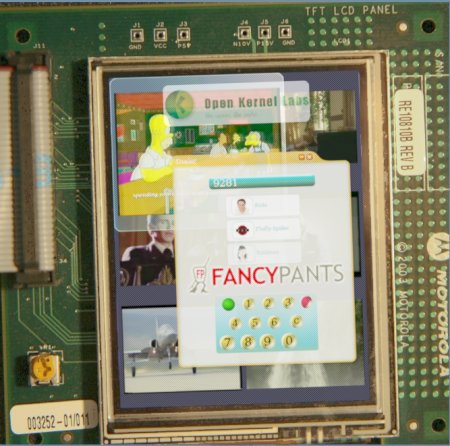Open Linux phone demo’s open virtualization
Oct 2, 2007 — by LinuxDevices Staff — from the LinuxDevices Archive — views Open Kernel Labs is demonstrating its commercially supported open source processor virtualization technology at the ARM Developer's Conference this week in Santa Clara, Calif. The OKL4 microkernel is reportedly running on FIC's OpenMoko Neo1973 phone, allowing two instances of Linux to share the phone's… ARM-based processor.
Open Kernel Labs is demonstrating its commercially supported open source processor virtualization technology at the ARM Developer's Conference this week in Santa Clara, Calif. The OKL4 microkernel is reportedly running on FIC's OpenMoko Neo1973 phone, allowing two instances of Linux to share the phone's… ARM-based processor.
(Click for larger view of the Neo1973 running OKL4)
Also running on the phone are two instances of the FancyPants GUI platform from Fluffy Spider Technologies (FST), the Australia-based GUI stack vendor said. Additionally, the products are reportedly being demonstrated on a Freescale i.MX21 reference design, as shown below.

OKL4 and FancyPants, on an i.MX21 reference design
(Click to enlarge)
Open Kernel Labs (OK Labs) markets OKL4, a completely open source virtualizing microkernel originally developed at NICTA (National Information/Communication Technology, Australia), an Australian government-sponsored think tank. NICTA first supplied the microkernel (then known as “L4”) to phone chip giant Qualcomm (story). OK Labs later supplied its commercialized OKL4 version to Toshiba for use in Toshiba's W47T phone, distributed by Japan's second-largest mobile carrier, KDDI.
OK Labs subsequently partnered with FST this summer, in a deal aimed at porting the FancyPants GUI stack directly to OKL4's POSIX-compliant real-time execution environment. However, the technology being showcased at the ARM devcon appears to be featuring two instances of FancyPants running under two instances of Linux, both running as guest OSes on the OKL4 microkernel.
According to OK Labs, OKL4 provides virtualization, high performance IPC (inter-process communications), and support for user-level device drivers. These features are claimed to reduce handset costs, and to improve reliability and security with less impact on performance than similar approaches.
In a statement, OK Labs President Steve Subar said, “The OpenMoko smart phone makes obvious the benefits of how OKL4 is being deployed to decrease cost while improving functionality and performance.”
In other news, the U.S. FCC (Federal Communications Commission) has signaled that open source technology such as OKL4 could face regulatory approval hurdles if used in software-defined radio applications such as mobile phone basebands. Meanwhile, Purple Labs, designer of the first mobile phone based on a single virtualized processor core, this month announced $14.5 million in Series A funding.
This article was originally published on LinuxDevices.com and has been donated to the open source community by QuinStreet Inc. Please visit LinuxToday.com for up-to-date news and articles about Linux and open source.